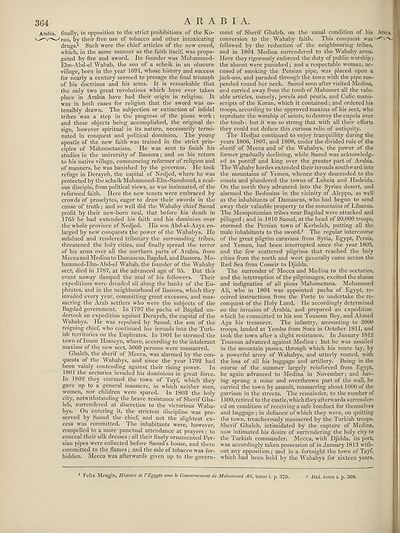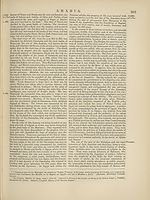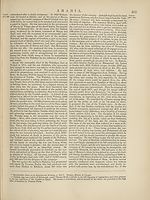Encyclopaedia Britannica > Volume 3, Anatomy-Astronomy
(372) Page 364
Download files
Complete book:
Individual page:
Thumbnail gallery: Grid view | List view

364 ARABIA.
Arabia, finally, in opposition to the strict prohibitions of the Ko- ment of Sherif Ghaleb, on the usual condition of his Arabia.
ran, by their free use of tobacco and other intoxicating conversion to the Wahaby faith. This conquest was'-^'-w.
drugs.1 Such were the chief articles of the new creed, followed by the reduction of the neighbouring tribes,
which, in the same manner as the faith itself, was propa- and in 1804 Medina surrendered to the Wahaby arms,
gated by fire and sword. Its founder was Mohammed- Here they rigorously enforced the duty of public worship;
Ebn-Abd-el Wahab, the son of a scheik in an obscure the absent were punished; and a respectable woman, ac-
village, born in the year 1691, whose history and success cused of smoking the Persian pipe, was placed upon a
for nearly a century seemed to presage the final triumph jack-ass, and paraded through the town with the pipe sus-
of his doctrines and his arms. It is remarkable that pended round her neck. Saoud soon after visited Medina,
the only two great revolutions which have ever taken and carried away from the tomb of Mahomet all the valu-
place in Arabia have had their origin in religion. It able articles, namely, jewels and pearls, and Cufic manu-
was in both cases for religion that the sword was os- scripts of the Koran, which it contained; and ordered his
tensibly drawn. The subjection or extinction of infidel troops, according to the approved maxims of his sect, who
tribes was a step in the progress of the pious work ; reprobate the worship of saints, to destroy the cupola over
and these objects being accomplished, the original de- the tomb; but it was so strong that with all their efforts
sign, however spiritual in its nature, necessarily termi- they could not deface this curious relic of antiquity,
nated in conquest and political dominion. The young The Hedjaz continued to enjoy tranquillity during the
apostle of the new faith was trained in the strict prin- years 1806, 1807, and 1808, under the divided rule of the
ciples of Mahometanism. He was sent to finish his sherif of Mecca and of the Wahabys, the power of the
studies in the university of Bassora; and on his return former gradually declining, while Saoud was acknowledg-
to his native village, commencing reformer of religion and ed as pontiff and king over the greater part of Arabia,
of manners, he was banished by the governor. He took The Wahaby hordes extended their inroads southward into
refuge in Derayeh, the capital of Nedjed, where he was the mountains of Yemen, whence they descended to the
protected by the scheik Mohammed-Ebn-Saouhoud, a zeal- coasts and plundered the towns of Loheia and Hodeida.
ous disciple, from political views, as was insinuated, of the On the north they advanced into the Syrian desert, and
reformed faith. Here the new tenets were embraced by alarmed the Bedouins in the vicinity of Aleppo, as well
crowds of proselytes, eager to draw their swords in the as the inhabitants of Damascus, who had begun to send
cause of truth ; and so well did the Wahaby chief Saoud away their valuable property to the mountains of Libanus.
profit by their new-born zeal, that before his death in The Mesopotamian tribes near Bagdad were attacked and
1765 he had extended his faith and his dominion over pillaged; and in 1810 Saoud, at the head of 20,000 troops,
the whole province of Nedjed. His son Abd-el-Azyz en- stormed the Persian town of Kerbeleh, putting all the
larged by new conquests the power of the Wahabys. He male inhabitants to the sword.2 The regular intercourse
subdued and rendered tributary the surrounding tribes, of the great pilgrim caravans from Syria, Egypt, Persia,
threatened the holy cities, and finally spread the terror and Yemen, had been interrupted since the year 1803,
of his arms over all the northern parts of Arabia, from and the few scattered pilgrims that reached the holy
Meccaand Medina to Damascus, Bagdad, and Bassora. Mo- cities from the north and west generally came across the
hammed-Ebn-Abd-el Wahab, the founder of the Wahaby Red Sea from Cosseir to Djidda.
sect, died in 1787, at the advanced age of 95. But this The surrender of Mecca and Medina to the sectaries,
event noway damped the zeal of his followers. Their and the interruption of the pilgrimages, excited the shame
expeditions were dreaded all along the banks of the Eu- and indignation of all pious Mahometans. Mohammed
phrates, and in the neighbourhood of Bassora, which they Ali, who in 1804 was appointed pacha of Egypt, re¬
invaded every year, committing great excesses, and mas- ceived instructions from the Porte to undertake the re-
sacring the Arab settlers who were the subjects of the conquest of the Holy Land. He accordingly determined
Bagdad government. In 1797 the pacha of Bagdad un- on the invasion of Arabia, and prepared an expedition
dertook an expedition against Derayeh, the capital of the which he committed to his son Tousoun Bey, and Ahmed
Wahabys. He was repulsed by Saoud, the son of the Aga his treasurer. The infantry, amounting to 2000
reigning chief, who continued his inroads into the Turk- troops, landed at Yembo from Suez in October 1811, and
ish territories on the Euphrates. In 1801 he stormed the took the town after a slight resistance. In January 1812
town of Imam Hosseyn, where, according to the intolerant Tousoun advanced against Medina ; but he was assailed
maxims of the new sect, 5000 persons were massacred. in the mountain passes, through which his route lay, by
Ghaleb, the sherif of Mecca, was alarmed by the con- a powerful army of Wahabys, and utterly routed, with
quests of the Wahabys, and since the year 1792 had the loss of all his baggage and artillery. Being in the
been vainly contending against their rising power. In course of the summer largely reinforced from Egypt,
1801 the sectaries invaded his dominions in great force, he again advanced to Medina in November; and bav¬
in 1802 they stormed the town of Tayf, which they ing sprung a mine and overthrown part of the wall, he
gave up to a general massacre, in which neither men, carried the town by assault, massacring about 1000 of the
women, nor children were spared. In 1803 the holy garrison in the streets. The remainder, to the number of
city, notwithstanding the brave resistance of Sherif Gha- 1500, retired to the castle, which they afterwards surrender-
leb, surrendered at discretion to the victorious Waha- ed on condition of receiving a safe conduct for themselves
bys. On entering it, the strictest discipline was pre- and baggage; in defiance of which they were, on quitting
served by Saoud the chief, and not the slightest ex- the town, treacherously massacred by the Turkish troops,
cess was committed. Ihe inhabitants were, however, Sherif Ghaleb, intimidated by the capture of Medina,
compelled to a more punctual attendance at prayers; to now intimated his desire of surrendering the holy city to
conceal their silk dresses ; all their finely ornamented Per- the Turkish commander. Mecca, with Djidda, its port,
sian pipes were collected before Saoud s house, and there was accordingly taken possession of in January 1813 with-
committed to the flames ; and the sale of tobacco was for- out any opposition ; and in a fortnight the town of Tayf,
bidden. Mecca was afterwards given up to the govern- which had been held by the Wahabys for sixteen years.
1 Felix Mengin, Histoire de CEgypte sous le Gouvernement de Mohammed AH, tome i. p. 379.
s Ibid, tome i. p. 380.
Arabia, finally, in opposition to the strict prohibitions of the Ko- ment of Sherif Ghaleb, on the usual condition of his Arabia.
ran, by their free use of tobacco and other intoxicating conversion to the Wahaby faith. This conquest was'-^'-w.
drugs.1 Such were the chief articles of the new creed, followed by the reduction of the neighbouring tribes,
which, in the same manner as the faith itself, was propa- and in 1804 Medina surrendered to the Wahaby arms,
gated by fire and sword. Its founder was Mohammed- Here they rigorously enforced the duty of public worship;
Ebn-Abd-el Wahab, the son of a scheik in an obscure the absent were punished; and a respectable woman, ac-
village, born in the year 1691, whose history and success cused of smoking the Persian pipe, was placed upon a
for nearly a century seemed to presage the final triumph jack-ass, and paraded through the town with the pipe sus-
of his doctrines and his arms. It is remarkable that pended round her neck. Saoud soon after visited Medina,
the only two great revolutions which have ever taken and carried away from the tomb of Mahomet all the valu-
place in Arabia have had their origin in religion. It able articles, namely, jewels and pearls, and Cufic manu-
was in both cases for religion that the sword was os- scripts of the Koran, which it contained; and ordered his
tensibly drawn. The subjection or extinction of infidel troops, according to the approved maxims of his sect, who
tribes was a step in the progress of the pious work ; reprobate the worship of saints, to destroy the cupola over
and these objects being accomplished, the original de- the tomb; but it was so strong that with all their efforts
sign, however spiritual in its nature, necessarily termi- they could not deface this curious relic of antiquity,
nated in conquest and political dominion. The young The Hedjaz continued to enjoy tranquillity during the
apostle of the new faith was trained in the strict prin- years 1806, 1807, and 1808, under the divided rule of the
ciples of Mahometanism. He was sent to finish his sherif of Mecca and of the Wahabys, the power of the
studies in the university of Bassora; and on his return former gradually declining, while Saoud was acknowledg-
to his native village, commencing reformer of religion and ed as pontiff and king over the greater part of Arabia,
of manners, he was banished by the governor. He took The Wahaby hordes extended their inroads southward into
refuge in Derayeh, the capital of Nedjed, where he was the mountains of Yemen, whence they descended to the
protected by the scheik Mohammed-Ebn-Saouhoud, a zeal- coasts and plundered the towns of Loheia and Hodeida.
ous disciple, from political views, as was insinuated, of the On the north they advanced into the Syrian desert, and
reformed faith. Here the new tenets were embraced by alarmed the Bedouins in the vicinity of Aleppo, as well
crowds of proselytes, eager to draw their swords in the as the inhabitants of Damascus, who had begun to send
cause of truth ; and so well did the Wahaby chief Saoud away their valuable property to the mountains of Libanus.
profit by their new-born zeal, that before his death in The Mesopotamian tribes near Bagdad were attacked and
1765 he had extended his faith and his dominion over pillaged; and in 1810 Saoud, at the head of 20,000 troops,
the whole province of Nedjed. His son Abd-el-Azyz en- stormed the Persian town of Kerbeleh, putting all the
larged by new conquests the power of the Wahabys. He male inhabitants to the sword.2 The regular intercourse
subdued and rendered tributary the surrounding tribes, of the great pilgrim caravans from Syria, Egypt, Persia,
threatened the holy cities, and finally spread the terror and Yemen, had been interrupted since the year 1803,
of his arms over all the northern parts of Arabia, from and the few scattered pilgrims that reached the holy
Meccaand Medina to Damascus, Bagdad, and Bassora. Mo- cities from the north and west generally came across the
hammed-Ebn-Abd-el Wahab, the founder of the Wahaby Red Sea from Cosseir to Djidda.
sect, died in 1787, at the advanced age of 95. But this The surrender of Mecca and Medina to the sectaries,
event noway damped the zeal of his followers. Their and the interruption of the pilgrimages, excited the shame
expeditions were dreaded all along the banks of the Eu- and indignation of all pious Mahometans. Mohammed
phrates, and in the neighbourhood of Bassora, which they Ali, who in 1804 was appointed pacha of Egypt, re¬
invaded every year, committing great excesses, and mas- ceived instructions from the Porte to undertake the re-
sacring the Arab settlers who were the subjects of the conquest of the Holy Land. He accordingly determined
Bagdad government. In 1797 the pacha of Bagdad un- on the invasion of Arabia, and prepared an expedition
dertook an expedition against Derayeh, the capital of the which he committed to his son Tousoun Bey, and Ahmed
Wahabys. He was repulsed by Saoud, the son of the Aga his treasurer. The infantry, amounting to 2000
reigning chief, who continued his inroads into the Turk- troops, landed at Yembo from Suez in October 1811, and
ish territories on the Euphrates. In 1801 he stormed the took the town after a slight resistance. In January 1812
town of Imam Hosseyn, where, according to the intolerant Tousoun advanced against Medina ; but he was assailed
maxims of the new sect, 5000 persons were massacred. in the mountain passes, through which his route lay, by
Ghaleb, the sherif of Mecca, was alarmed by the con- a powerful army of Wahabys, and utterly routed, with
quests of the Wahabys, and since the year 1792 had the loss of all his baggage and artillery. Being in the
been vainly contending against their rising power. In course of the summer largely reinforced from Egypt,
1801 the sectaries invaded his dominions in great force, he again advanced to Medina in November; and bav¬
in 1802 they stormed the town of Tayf, which they ing sprung a mine and overthrown part of the wall, he
gave up to a general massacre, in which neither men, carried the town by assault, massacring about 1000 of the
women, nor children were spared. In 1803 the holy garrison in the streets. The remainder, to the number of
city, notwithstanding the brave resistance of Sherif Gha- 1500, retired to the castle, which they afterwards surrender-
leb, surrendered at discretion to the victorious Waha- ed on condition of receiving a safe conduct for themselves
bys. On entering it, the strictest discipline was pre- and baggage; in defiance of which they were, on quitting
served by Saoud the chief, and not the slightest ex- the town, treacherously massacred by the Turkish troops,
cess was committed. Ihe inhabitants were, however, Sherif Ghaleb, intimidated by the capture of Medina,
compelled to a more punctual attendance at prayers; to now intimated his desire of surrendering the holy city to
conceal their silk dresses ; all their finely ornamented Per- the Turkish commander. Mecca, with Djidda, its port,
sian pipes were collected before Saoud s house, and there was accordingly taken possession of in January 1813 with-
committed to the flames ; and the sale of tobacco was for- out any opposition ; and in a fortnight the town of Tayf,
bidden. Mecca was afterwards given up to the govern- which had been held by the Wahabys for sixteen years.
1 Felix Mengin, Histoire de CEgypte sous le Gouvernement de Mohammed AH, tome i. p. 379.
s Ibid, tome i. p. 380.
Set display mode to:
![]() Universal Viewer |
Universal Viewer | ![]() Mirador |
Large image | Transcription
Mirador |
Large image | Transcription
Images and transcriptions on this page, including medium image downloads, may be used under the Creative Commons Attribution 4.0 International Licence unless otherwise stated. ![]()
| Encyclopaedia Britannica > Encyclopaedia Britannica > Volume 3, Anatomy-Astronomy > (372) Page 364 |
|---|
| Permanent URL | https://digital.nls.uk/193762184 |
|---|
| Attribution and copyright: |
|
|---|---|
| Shelfmark | EB.16 |
|---|---|
| Description | Ten editions of 'Encyclopaedia Britannica', issued from 1768-1903, in 231 volumes. Originally issued in 100 weekly parts (3 volumes) between 1768 and 1771 by publishers: Colin Macfarquhar and Andrew Bell (Edinburgh); editor: William Smellie: engraver: Andrew Bell. Expanded editions in the 19th century featured more volumes and contributions from leading experts in their fields. Managed and published in Edinburgh up to the 9th edition (25 volumes, from 1875-1889); the 10th edition (1902-1903) re-issued the 9th edition, with 11 supplementary volumes. |
|---|---|
| Additional NLS resources: |
|

